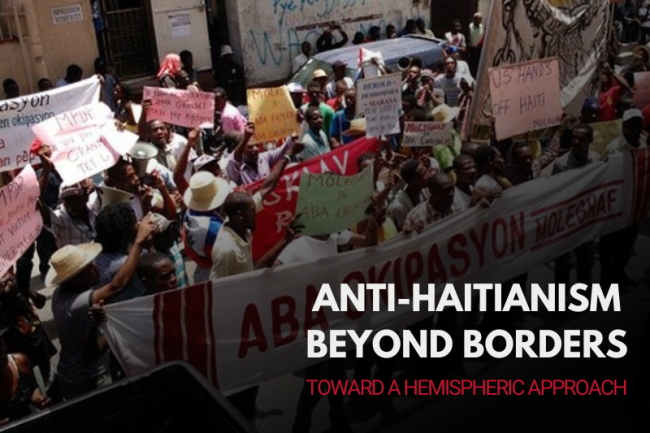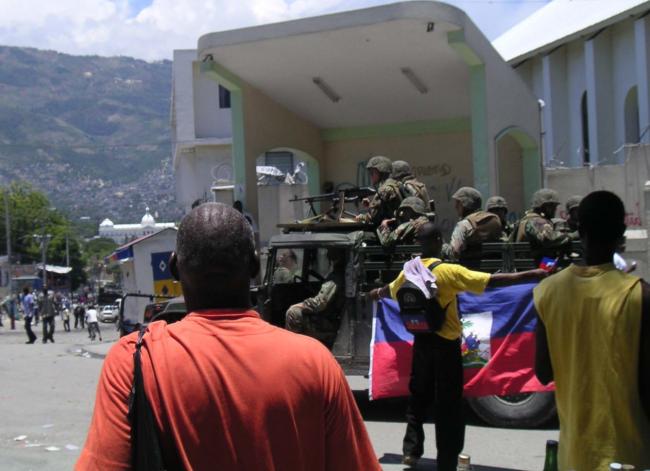
This piece is the final installment of a series on hemispheric approaches to anti-Haitianism.
We decided to launch this series on September 30, shortly after the Harris-Trump presidential debate and in clear view of widespread anti-Haitianism across the Americas. Over the past few decades, scholars, journalists, and activists have documented how anti-Haitianism—a specific combination of anti-Blackness and xenophobia—has fueled right-wing political agendas, white nationalism, and anti-immigrant policies, leading to violent consequences for Haitian populations from Santiago, Chile, to Del Rio, Texas. It was evident to us then that the false claims Trump repeated about Haitian immigrants in Springfield, Ohio, during the debate would contribute to the rising tide of anti-Haitianism.
In this view, we invited contributors to the series who shared a common goal: to intensify our organizing efforts against this hate, not only in the United States but wherever anti-Haitianism manifests.
Soon after the presidential debate, Trump’s deliberate falsehoods against Haitians gained momentum as a Republican voter turnout strategy. The comments were also repeated jokingly as memes and in late-night talk shows, underestimating the seriousness and depths of anti-Haitianism and contributing to its propagation. As Obed Lamy reported from Springfield, attacks on the community rose sharply, with an immediate impact on Haitian-owned businesses in the area. In the wake of Trump’s win, Haitians in Springfield, most of whom have legal status in the United States, have begun fleeing Springfield for fear of deportation. Haitians in Springfield were not the only ones affected, as the comments stoked anti-Haitian sentiments and violence across the Americas.
While certainly not the only factor, this coordinated attack on Haitians, who, as Bertin Louis reminds us, are often seen as the “Blackest of the Black,” arguably helped push political winds rightward. Having gained a lead in the polls, Harris’ support peaked days after her opponents’ spurious comments on September 10: in Wisconsin on September 11, North Carolina on September 14, also when her deepest slide in Georgia began, and Michigan and Pennsylvania on September 19, followed by her peak in nationwide polls on September 21. Harris never recovered; in the end, Trump would sweep all seven ‘swing states’ and, therefore, the election.
We would never claim that these comments single-handedly altered the course of history. While undoubtedly unconscious for some, Trump’s call to arms and promises of swift deportation awoke deeply rooted fears of what Haiti represents: freedom for Black peoples everywhere, self-determination, and a revolution that ended slavery.
“Pulling Our Forces Together”: A Transnational Town Hall
Regardless of the outcome of the U.S. presidential election, we recognized the necessity for what François Pierre-Louis referred to as "another march on the Brooklyn Bridge"—the need for bipartisan mobilization, as if people's lives depend on it—because they do. For instance, over 200,000 people in the United States are at risk of deportation, as the Biden administration declared that it would not renew the humanitarian parole program. As we wrote in the introduction, immigration and anti-Blackness are a two-party consensus.
We not only need to remove partisan blinders; a hemispheric approach is necessary to confront violence against Haitians. Emboldened by nativist rhetoric, the Dominican Republic announced in October that it would begin deporting 10,000 Dominicans of Haitian descent per week, as Gabrielle Apollon’s piece details. Handerson Joseph, a Haitian anthropologist working at a university in Brazil, shared the experiences of Haitian people being shot in front of a church and then denied entry to a hospital in Brazil, which has the largest Black population in the Americas.
For these reasons, in October we began planning a Town Hall that would take place a week after the election. Hosted by the Haitian Studies Association (HSA) and co-sponsored by the HSA, NACLA, Faith in Action, NYU School of Law’s Global Justice Clinic, Haitian Bridge Alliance, Human Rights First, Institute for Justice and Democracy in Haiti, and Quixote Center, the Town Hall brought the series contributors together with a concerned public on Tuesday, November 12 to, in Pierre-Louis’ words, “pull our forces together.”
The event, titled "Organizing Against Anti-Haitianism After the U.S. Election," was a demonstration of solidarity and democracy. Over 200 participants joined this live-streamed Town Hall, archived on YouTube. Presenters-contributors led attendees from the U.S., Canada, Europe, Latin America, Haiti, and Japan in brainstorming sessions to identify short-term and long-term solutions outlined in this document. Participants—scholars, students, activists, artists, and journalists—pledged their solidarity, shared resources, and sought local connections, creating a much-needed space for community-building and collective empowerment.
Fear of the mass deportations of Haitians, like those occurring in the Dominican Republic, loomed large over the conversations, especially given the targeting of Haitian immigrants and Trump’s campaign promises for the “biggest mass deportations in U.S. history,” invoking the 1798 Aliens Act. A professor from a sanctuary city in New Jersey, for example, noted that the enforcement of the Real ID could create obstacles for undocumented individuals who had found work and established communities in “red states” and might now need to fly to sanctuary cities. He also feared the “deputization” of local police for immigrant enforcement. Beyond deportations, the Town Hall revealed a dread of, in the words of one participant, “random violence against Haitians, Black people, [and] people with accents.” These conversations reflected widespread worries that there may be “no safe places” for Haitians to turn.
Given the promises of mass deportations and sanctions, participants also worried that traditionally affirming spaces would roll up the welcome mat. For example, a Haitian-Canadian immigrant rights activist highlighted the increasing deportation of undocumented Haitians in Quebec—often perceived as a safe haven for Haitian migrants. Quebec Premier François Legault has already expressed concern over a “mass influx of immigrants" under the new Trump administration, stating that Quebec has already reached capacity.

Identifying Solutions
Against these sobering realities and anxieties, participants identified solutions such as pro-bono immigration attorneys, Kreyòl language phone consultation, know-your-rights training, and connecting with and supporting Haitian elected officials. Several attendees pointed to the need for Haitian American citizens to organize, unify, and lead in directing advocacy. Solidarity with African American institutions, such as HBCUs, businesses, and churches, was suggested as an essential step, including leaning into the Congressional Black Caucus, which many participants wished would take more active and visible engagement in support of Haitians.
The Town Hall also identified the need to work locally, at least in the short term. However, it is equally important not to lose sight of longstanding issues of racial justice and the U.S. policies toward Haiti that triggered the massive wave of migration in the first place. Specific local suggestions include rapid response networks, connecting with mutual aid groups, collaborating with churches to identify sanctuary spaces and community resources, working with city councils to establish sanctuary cities, and directing law enforcement not to cooperate with U.S. Immigration and Customs Enforcement (ICE). Where there are sanctuary cities, it’s essential to re-engage policymakers and law enforcement to ensure follow-through.
The Haitian community has grown in number and has been actively mobilized since the 1990 march on the Brooklyn Bridge. However, as a retired Haitian school teacher and therapist put it, it is crucial for “non-Haitian people to act in solidarity so that the burden does not fall systematically onto the shoulders of minoritized groups.”
Specifically, the white U.S. majority must leverage their racialized privilege and stand up not only as allies but as accomplices. The first step is for white people to educate themselves on Haiti and acknowledge—and address—their complicity in white supremacy. Participants shared specific media and educational resources for people who wish to take this first step. Another suggestion was for white allies and accomplices to engage their communities and institutions, such as churches. One participant wrote: “Allies can—from your positionality—raise the questions in your own spaces—predominantly white churches are a great place to start. Hold them accountable.” Having conversations is a necessary step, and sharing humanizing stories is essential. “But stories can’t end there. Bring these stories to people making policy. Turn your access (positionality) into POWER for CHANGE,” they added.
A critical takeaway from the Town Hall was the value of thinking "hemispherically" as a means of fostering solidarity and challenging the idea of United States exceptionalism. Transnational spaces provide opportunities for unity and hope, especially in light of real threats to safety. There are still areas in the hemisphere where the effects of anti-Blackness are less pronounced, allowing Haitian communities to coexist and thrive. By organizing within transnational networks like the Rezo Emisferik (Hemispheric Network for the Rights of Haitian Migrants)—co-created by Apollon and others—activists can exchange strategic insights and tactical opportunities.
In the words of human rights lawyer and activist Guerline Jozef, the historical and contemporary scapegoating of Haitians is “not because we are the weakest link but because we are the strongest. Because they know for a fact if they can bring us down, if they can destroy our courage, if they can destroy our resilience, then every other group becomes fair game. . . . If we fall, others will follow.” Throughout history, the quest for white dominance has consistently required undermining Haiti’s freedom and demonizing its people—the island republic that pioneered Black emancipation for the rest of the world.
If we consider the seriousness of the deadly threats we face, Haitian people are, in Gina Athena Ulysse’s words, “being asked to cause changes in the world.” This current climate of anti-Haitianism represents terrifying echoes of the Fugitive Slave Act, requiring the courage of a Harriet Tubman, of a Defilee, of an Anacaona. We must stand tall in these big shoes our ancestors left for us.
We end with François Pierre-Louis's words in concluding his piece for the NACLA series, “Once we pull our forces together, nothing can stop us.
Darlène Dubuisson is Assistant Professor of Cultural Anthropology at the University of Pittsburgh. She works on issues of Global anti-Blackness, migration and diaspora, and crises and futures, with a geographic focus on the Caribbean and Latin America. She is the author of Reclaiming Haiti’s Futures: Returned Intellectuals, Placemaking, and Radical Imagination.
Mark Schuller is Professor of Anthropology and Nonprofit and NGO Studies at Northern Illinois University. His eight books include Humanity’s Last Stand: Confronting Global Catastrophe, and he co-directed/co-produced Poto Mitan. Schuller received the Margaret Mead Award, the Anthropology in Media Award, and the Haitian Studies Association’s Award for Excellence.

